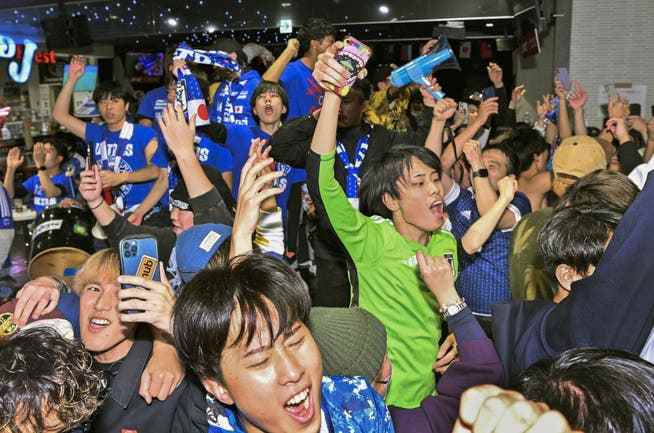The times of the traditional deep stacking are over in Japan, the national team wants to reach the quarter-finals at the World Cup. One reason for the high is that Japanese footballers have learned toughness and willingness to fight.
Japan has one of the strongest squads in football history – and dreams of making it into the top four teams in the world.
On the morning after the 2-1 win against Spain and the group victory at the World Cup, the world in Japan has long been spinning. In the rush hour, Tokyo works like a well-oiled machine: people squeeze themselves to the fullest, stare silently at their smartphones or paperbacks so as not to disturb anyone in the oppressive confinement. The screen announcing the stops transmits the news headlines into the train. But there was no jubilation about the great victory of the Japanese in the difficult group with Germany, Spain and Costa Rica.
The composure with which Japan acknowledges the progress, which has come as a surprise to large parts of the world, is remarkable. Maybe that’s because the final and decisive group game against Spain started at 4 a.m. local time. The win in the first group game against Germany kicked off at 10 p.m. Japanese time – the pubs were full and the cheers on the streets were correspondingly loud after the final whistle.
Scenes in Japan after their historic World Cup win against Germanypic.twitter.com/ubFCXuKJGu
— FIFA World Cup 2022 (@2022_QatarWC) November 23, 2022
But there is probably another reason for the sobriety on the morning after the triumph, and that can be heard indirectly on TV station Abema. The commentator says with a grin: “Our coach said he wanted to create new prospects for Japanese football. That would be done now. Maybe we’ll even make it into the last four.” In other words, getting ahead was almost planned in Japan. Coach Hajime Moriyasu had given the quarter-finals as the official goal. Now you think ahead.
Japan has the strongest squad in its history
The time of deep stacking, which is considered an old virtue in Japan, is over in football. A quarter-final entry would be the best performance in national World Cup history. But this attitude of entitlement is hardly surprising. Japan may have the strongest squad in its history.
In previous years, the country always had a handful of players who attracted international attention. Today, almost all of them are or were under contract with successful European clubs, many of them as top performers. In the Bundesliga alone, these include midfielder Ritsu Doan from SC Freiburg, Daichi Kamada from Eintracht Frankfurt and Wataru Endo from Stuttgart. There are also defenders Maya Yoshida from Schalke and Ko Itakura from Borussia Mönchengladbach. Joining them are AS Monaco’s Takumi Minamino, Real Sociedad’s Takefusa Kubo and Arsenal’s Takehiro Tomiyasu. The list goes on.
Japanese commentary on Japan’s second goal #JPN pic.twitter.com/NeWw0XPJWb
— Futbol (@El_Futbolesque) December 1, 2022
It’s no longer just diligence and solid technology
In contrast to earlier generations, the Japanese players no longer only stand out because of their solid technique and diligence, but also because of their physical toughness and willingness to fight. This time, Japan is unlikely to win the fair play trophy, which is proudly presented in multiple versions of various tournaments in Tokyo’s football museum. The team received six yellow cards in the group stage – the most in Group E with Costa Rica.
Adding to Japan’s new toughness is a pressing and defensive build built on a strong collective. And both against Germany and against Spain, Japan converted a deficit into a lead within a few minutes through intensive pressure phases.
The World Cup in Qatar is not a political issue in Japan
The national coach Moriyasu took the concept of the collective a little further: Shortly before the start of the World Cup he addressed the public with these words: “We absolutely need the support of the fans and the whole country. I ask you to encourage us with all your might to fight with us.” And because the World Cup in Japan, which is controversial elsewhere, is hardly thought of politically, and instead the sport is the main topic, people get involved.
The fact that Tokyo isn’t in the mood for celebration on Friday morning doesn’t mean the national team isn’t being closely followed. TV channels report daily from Qatar, newspapers open with jubilant stories. After the 2-1 win against Spain, the daily newspaper “Asahi Shimbun” ran the headline: “This is the beginning of a new story.” The sensational newspaper “Nikkan Sports” writes: “Thank you already!”

Japanese fans celebrate the 2-1 win over Spain at a bar in Osaka.
That’s how the Japanese representatives in the stadium see it too. “To all of you: bravo!” says the 36-year-old veteran Yuto Nagatomo, who spent a large part of his career in Serie A. Ritsu Doan, who came on at half-time and was involved in both goals, called out to the people of Japan: “Good morning. Thanks for tuning in!»
In the round of 16, Japan will meet Croatia, the 2018 World Cup finalists, next Monday at 4 p.m. Central European Time. Nevertheless, a victory is planned for Japan. You want to go to the quarterfinals. At least.
